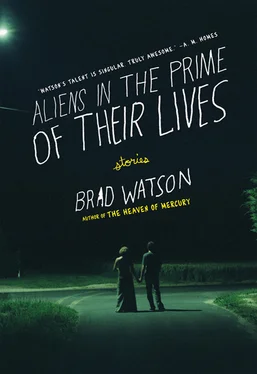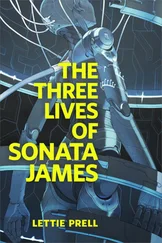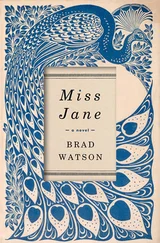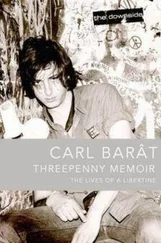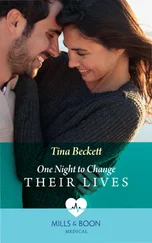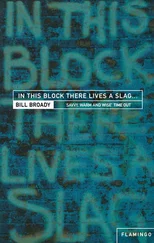I heard a loud thawongabumpbump and a broad shapeless shadow darted onto the dimpled surface of the pool. There again was Harry suspended in all his bulk high in the air, a diving mule pushed off the circus platform. At the last second he tucked his head and rolled over onto his shoulders, sending an arc of water toward a mother and her two toddlers in the shallow end. They screwed up their faces and recoiled. When the water settled they all three turned, dripping, to stare at Harry, the mother annoyed, the children bewildered.
That’s enough, Harry, the woman said. She’d snatched her hat off and I saw she was wearing a man’s heavy black sunglasses, like our father’s, and her wide mouth was painted bright red. Her hair was frizzled and graying.
All right, sorry, Harry said.
But as soon as the woman had pulled the hat brim down over her eyes, Harry was up and tiptoeing back to the diving board. He made shushing gestures to all of us, a finger to his lips. At the shallow end, the mother hustled her two toddlers from the pool, grabbed up their things, and headed for their room.
Harry was poised at the base of the board. He spread his arms, rose on his toes, and pranced down its length. He swung his arms above his head, scrunched his big body down like a compressed spring. The board bent almost to the surface of the water, seemed to hesistate there, then cracked and split down its length and tossed Harry awkwardly into the air.
He hit the water with a loud, flat smack. The split board bounced a couple of times and lay still. Harry floated motionless as the rocking water lapped the edges of the pool. A little scarlet cloud bloomed around him. Then he jerked into a flurry of motion. His head rose up and he bellowed, then sank down again.
The big woman shouted and stood up from her chair, her hat tumbling into the grass. Two men standing poolside leapt into the water. They managed to subdue Harry and pull him to the pool’s edge. The woman stood rigid, watching them, her mouth hanging open. Then she closed it with a clap and her face took on what looked like a long-practiced expression of disgust. Other people came and helped drag Harry out onto the concrete apron. He made a groaning, desperate sound. Blood leaked from a wound on his foot. One of the men who’d helped rescue Harry from the pool pulled a car around, and he and the other man helped Harry into it. The woman got into the back seat beside Harry and they drove away, to the hospital I suppose.
I walked over to the diving board, leaned down low, and looked at the split board, its two pieces splayed, blond splinters sticking out like bleached porcupine quills. Hanging there jammed tight in the split, a small blunt wedge drained of color, was what appeared to be Harry’s little toe.
It was fantastic. It made the whole trip.
OUR MOTHER WAS HORRIFIED, of course. One year, a drowning. The next, a dismembered toe. Not so disturbing as a death, but awful in its own way. I think it settled deeply into her subconscious, an augury somehow of vague misfortune looming.
For our father, who was her opposite in terms of being able to live in the moment instead of living each present moment with a terrible awareness of the past and a foreboding sense of the future, the accident had a different effect. He would remember it with a kind of morbid humor, closing his eyes and pursing his lips and shaking with silent, wincing laughter. Ooo, shit, that had to hurt, he’d say. I still remember the time, riding with him in the car when I was a boy, and I had my arm out the passenger-side window. He glanced over and told me to take my arm into the car, that he’d heard about a man riding along with his arm out the window who was sideswiped by another car that took his arm right off at the shoulder. Ever since, I’ve never been able to leave my arm out a car window if there are other cars present within anything close to striking distance. I live with a combination of my mother’s morbid fear of danger, and my father’s irreverent appreciation of it.
ANYWAY, YEARS LATER, I wasn’t even sure if the incident with the poor man’s toe had really happened. It had been so long ago, and I had been so young, and I hadn’t thought about it in some time. But I had been remembering it and trying to recall the details when I had the disturbing thought that I may have invented it all. I asked my mother if she remembered it. She was eating a piece of toast at the breakfast table, so I suppose my timing wasn’t good. She stopped chewing, as if stomach acid had suddenly boiled into her esophagus, and her eyes took on that vaguely alarmed and unfocused look she got when she was presented with something horrible. But then it passed, and she swallowed.
It was his big toe, she said.
I found that hard to believe and said so. I asked was she certain.
I’m certain, she said. That’s what made it so horrible.
I saw my father a couple of weeks later, though, and put the question to him. I told him what my mother said. He scoffed.
It wasn’t his big toe, he said, that would’ve been impossible. It was his little toe.
I didn’t say anything.
It’s just like your mother to make it into something worse than it actually was, he said.
SO, WE WENT BACK home that very afternoon of the accident, and a storm had passed through. A tornado had hopped right over our neighborhood, which was in a low area between two modest ridges, and had snapped off the tops of several tall pines. One of the pine tops lay in our backyard, another in the street in front of our house. The air was gray and you could smell the spent, burned residue of destructive energy in the air, feel it prickling the skin, as if we were inside a big discharged gun barrel. Green leaves and small limbs were strewn across yards and in the street and on rooftops. A telephone pole leaned toward the ground, the wires on one side taut, those on the other side loose and hanging low toward the damp grass. Everything was wet and smoking.
Some incredible violence had occurred, and yet almost everything remained intact. There sat our little brick ranch-style house. There, the pair of mimosas in the yard where I crouched concealed in the fernlike leaves, dreaming of Tarzan. There, the azaleas beneath mine and Ray’s bedroom window where every year our mother took an Easter photo of her boys, our bow ties and vests and hair flipped up in front. There, the picture window of the living room we used only at Christmas or when she and our father hosted their supper club. There, the inexplicable everyday, the oddness of being, the senseless belonging to this and not that. I was barely able to contain myself. Something in me wished it had all been blown to smithereens.
THE DOCTORS HAD DELIVERED BETH AND TEX’S ONLY child stillborn, in breech, and the child had come apart. Their voices seemed to travel to her from a great distance and then open up quietly, beside her ear. She felt the strength leave Tex’s grip on her hand as if his heart had stopped, the blood in his body going still. She looked up at him, but he turned away. Then the drugs had taken over, what they’d given her after so much reluctant labor, and she drifted off.
They allowed the funeral home to take their child, and to fix her, though they’d never had any intention of opening the casket or even having a public service. And neither did they view the man’s work at all, despite his professional disappointment. He understood they wouldn’t want others to view her, but seemed to think they’d want to see her themselves. He was a soft and pale supplicant, Mr. Pond, who kind of looked like a sad baby himself, with wet lips and lost eyes. They explained, as best they could, that they’d wanted only to have her as whole again as she could possibly be, never having been whole and out in the world. But Beth couldn’t bear to see it, to see her looking like some kind of ghoulish doll. They’d named her Sarah, after Beth’s mother, who’d died the year before. Beth found a fading black-and-white photograph of her mother as an infant on a blanket beside a flowering gardenia bush. She placed it in her wallet’s secret compartment. This was what her Sarah would have looked like.
Читать дальше
